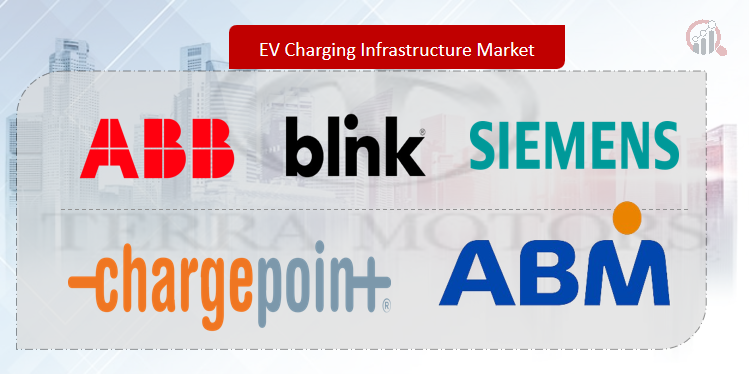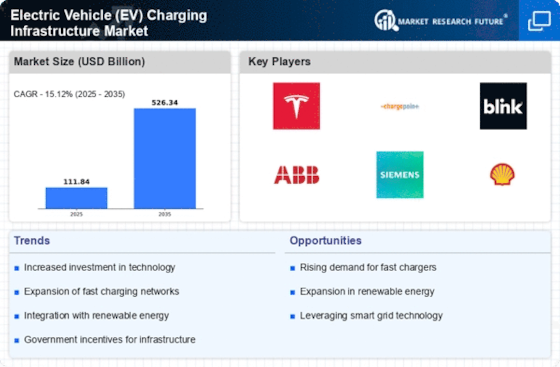Top Industry Leaders in the Electric Vehicle EV Charging Infrastructure Market

*Disclaimer: List of key companies in no particular order
Top listed global companies in the Electric Vehicle (EV) Charging Infrastructure industry are:
ABB
Siemens AG
ChargePoint, Inc.
EVgo Services LLC
Schneider Electric
Blink Charging Co.
CyberSwitching
ABM Industries Incorporated
PHIHONG USA CORP. (PHIHONG TECHNOLOGY CO)
Electrify America.
Bridging the Gap by Exploring Top Leaders Competitive Landscape of the Electric Vehicle (EV) Charging Infrastructure Market
The EV charging infrastructure market is experiencing explosive growth, driven by surging EV adoption and ambitious government policies. This dynamic landscape boasts a diverse range of players, each vying for a share of the pie. Analyzing their strategies, market share factors, and emerging trends is crucial for understanding the competitive scenario.
Key Player Strategies:
Traditional Energy Companies: Giants like Shell and TotalEnergies are leveraging their existing fuel station networks to establish EV charging hubs. They offer integrated services like convenience stores and maintenance, aiming to attract a wider customer base.
Charge Point Operators (CPOs): Dedicated players like ChargePoint and EVgo focus on building and operating extensive networks of public charging stations. They offer subscription plans and partnerships with businesses to secure prime locations and ensure station utilization.
Automakers: Tesla leads the pack with its proprietary Supercharger network, catering exclusively to Tesla vehicles. Other brands are forming partnerships with CPOs or investing in their own charging infrastructure to provide seamless charging experiences for their customers.
Technology Companies: Tech giants like Siemens and ABB are applying their expertise in smart grids and energy management to develop intelligent charging solutions. They offer software platforms that optimize charging based on grid availability and demand, aiming to improve efficiency and reduce costs.
Startups: Agile startups are entering the fray with innovative charging solutions, such as ultra-fast charging stations, mobile charging trailers, and even solar-powered charging pods. They are targeting niche markets or offering unique features to differentiate themselves.
Factors for Market Share Analysis:
Network Size and Coverage: The number and location of charging stations are crucial factors, especially for public charging. Players with wider networks and strategic partnerships with businesses and municipalities gain an edge.
Charging Speed and Technology: Offering faster charging speeds through DC fast chargers attracts customers and reduces range anxiety. Technological advancements like bi-directional charging and vehicle-to-grid (V2G) capabilities further differentiate players.
Pricing and Service Models: Competitive pricing plans, flexible subscription options, and value-added services like loyalty programs and integrated payments play a significant role in attracting and retaining customers.
Brand Reputation and Customer Experience: A strong brand reputation built on reliability, ease of use, and customer support is key to long-term success. Seamless charging experiences and user-friendly apps enhance customer loyalty.
Government Incentives and Regulations: Government policies promoting EV adoption and subsidies for charging infrastructure deployment can significantly impact market share. Players who align with these policies and secure funding are at an advantage.
New and Emerging Trends:
Focus on Urban Mobility: Players are targeting high-traffic urban areas with innovative solutions like curbside charging and integrated parking charging infrastructure.
Renewable Energy Integration: Integrating solar panels or other renewable energy sources into charging stations is gaining traction to promote sustainable charging practices.
Smart Charging and Grid Management: Advanced software platforms that optimize charging based on grid load and renewable energy availability are becoming increasingly important.
V2G Technology: Enabling EVs to sell excess power back to the grid creates new revenue streams for both EV owners and CPOs.
Collaboration and Partnerships: Partnerships between players across the EV ecosystem, including automakers, energy providers, and technology companies, are fostering innovation and accelerating market growth.
Overall Competitive Scenario:
The EV charging infrastructure market is characterized by intense competition, with established players expanding their networks and startups emerging with disruptive solutions. Players who can adapt to the evolving market dynamics, leverage technological advancements, and offer compelling value propositions will be best positioned to succeed. Collaboration and strategic partnerships will be key to navigating this complex landscape and building a sustainable competitive advantage.
Latest Company Updates:
ABB:
• Jan 25, 2024: Announced partnership with Porsche to develop and supply high-power charging (HPC) infrastructure for Porsche's charging network in North America. (Source: ABB Press Release)
Siemens AG:
• Jan 18, 2024: Signed framework agreement with Shell to collaborate on EV charging solutions, including smart charging and grid integration. (Source: Siemens Press Release)
ChargePoint, Inc.
• Jan 17, 2024: Announced expansion of Express DC charging network to major highways in the US and Canada. (Source: ChargePoint Blog)
EVgo Services LLC:
• Oct 26, 2023: Announced partnership with Walmart to install EV chargers at 1,000 Walmart stores across the US. (Source: EVgo Press Release)










